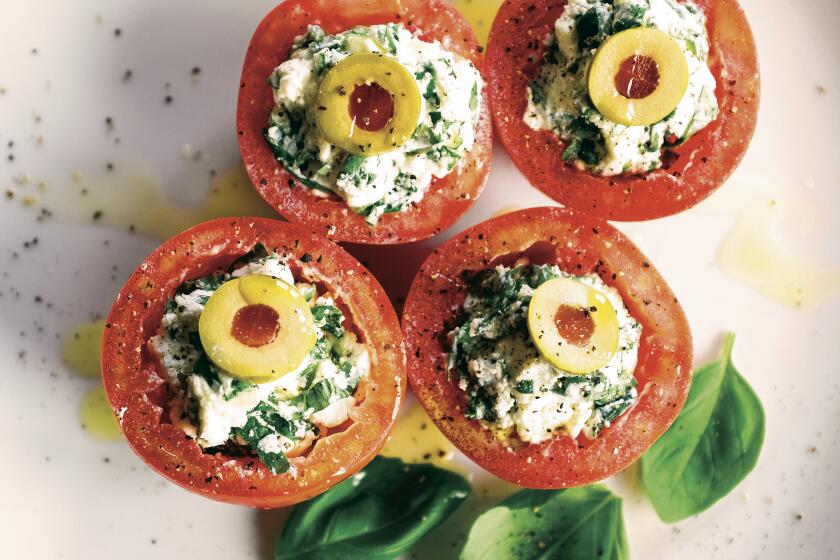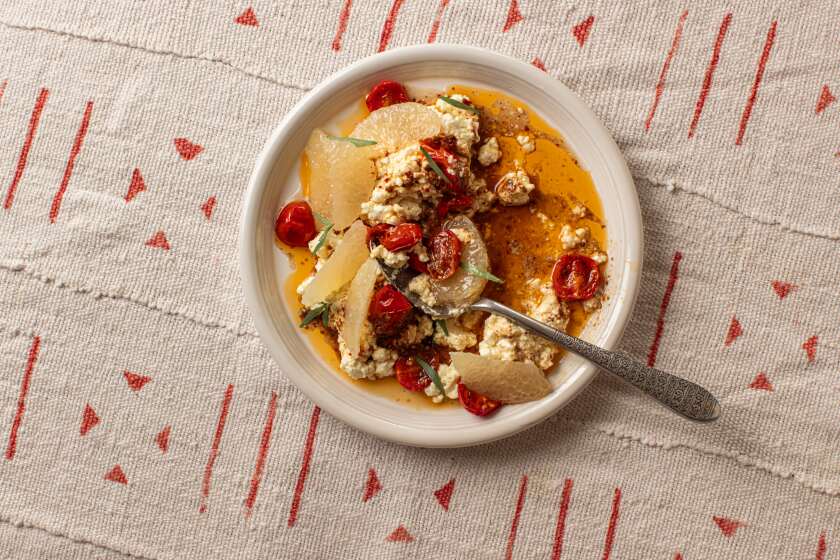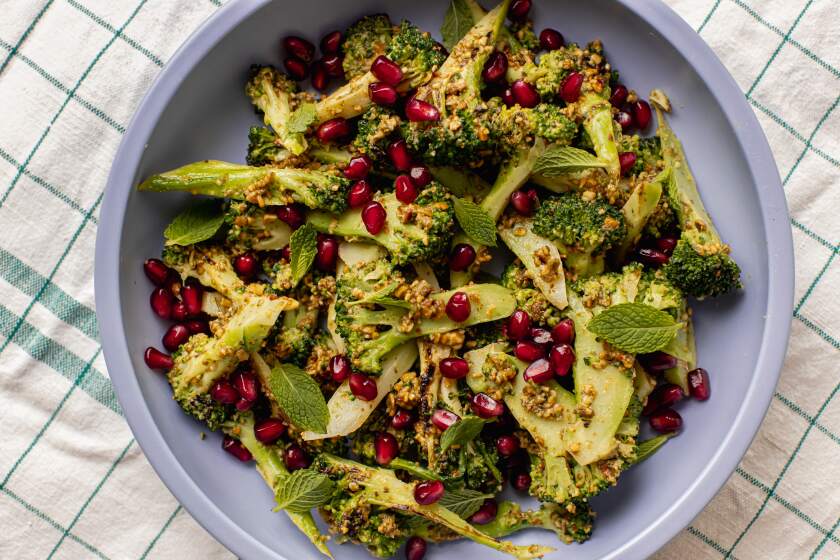Persian cucumber salad with walnuts and golden raisins

Itâs a great time of year for kitchen gardeners. Good rains mean great greens, and weâve been happily tracking muddy footprints into the house as we bring in fresh-cut large-leaf mache or Italian wild arugula. At the same time, weâre thinking about what to plant for spring and summer harvesting.
For near-immediate gratification, plant radishes and spring onions right away as well as another round of lettuces and greens. Try one of the several radicchio varieties available as seedlings from Windrose Farm of Paso Robles at the Santa Monica Farmersâ Market on Wednesdays. Barbara Spencer, owner, says she has some great chicory varieties ready to plant.
Not quite as fast-growing, but an indispensable part of spring harvests, are fragrant strawberries. For the happy surprise of them, and for what many say is an even sweeter taste than the red, try Yellow Wonder, a yellow alpine strawberry from Swallowtail Garden Seeds in Santa Rosa.
The next several weeks are also great for planting herbs. Italian Cameo basil, new from Renee Sheppardâs Reneeâs Garden Seeds in Felton, has big leaves that will make as much pesto as you can eat, but is a compact 8 inches tall, nice for an edging plant in the garden, or a good choice for those whose kitchen garden is a window box. Reneeâs Garden also offers wonderful salad greens collections.
Your Italian grandmother, if you had one, might tell you to saute mixed, fresh mushrooms in a little olive oil and sprinkle them with a generous handful of chopped mentuccia, an Italian herb thatâs been hard to find locally until recently. Jimmy Williams of Hayward Organic Gardening hadnât even heard of it when a customer brought him some seeds from Italy a few years ago.
Williams, who says he âlearned everything I know about gardening from my Gullah grandmother,â now grows mentuccia as well as other hard-to-find vegetables and herbs organically in his Hollywood backyard. He and his son, Logan, sell seedlings at the Sunday Hollywood Farmers Market and on Wednesdays in Santa Monica.
Mentuccia is used in classic Roman artichokes, carciofi alla Romana, stuffed with a paste of minced garlic and mentuccia, then braised in white wine and olive oil.
Subtle but rich
Many recipes suggest mint or parsley, because mentuccia hasnât been available, but once you taste the real thing -- rich, subtle, almost buttery -- you wonât be able to imagine a substitute. It has a marvelous affinity for mushrooms, artichokes and fish. Sal Marino, chef-owner of Il Grano restaurant in West L.A., also suggests strewing mentuccia across a frittata.
Ben Ford, chef-owner of Fordâs Filling Station in Culver City and a committed gardener âsince the second grade,â is planning an herb garden of burnet, cilantro and French thyme, an herb he says he canât do without (both Jimmy Williams and Windrose Farm sell French thyme plants).
This year, Ford is also interested in agretti, a feathery-leafed Italian vegetable (seeds are available from Seeds of Italy) with a flavor he describes as âsalty and sea-vegetable-like.â
Down the street, Tender Greens co-owner and co-chef Erik Oberholtzer plans a home garden of âgreat heirloom varietalsâ that do well in small spaces such as his coastal patio. Green Fingers Persian baby cucumber from Reneeâs Garden is a small-space, big-harvest plant thatâs tolerant of powdery mildew and difficult conditions, meaning itâll be especially welcome for beach-area gardeners.
Itâs not too early to gather seeds for planting in April and May. Children and grown-ups alike will be charmed by World of Color giant pumpkins grown from seedlings sold by Windrose Farms. They have skins in shades of blue (yes, blue!), white, peach, pink and deep orange. âItâll be a bit of a lottery in a six-pack,â Spencer says.
For summer harvesting, owner Jere Gettle of Baker Creek Heirloom Seeds in Missouri recommends Robertoâs Cuban Seasoning peppers, describing their balance of sweet and hot flavor as âsmoky and fruity -- like habaneros, without the intense heat.â
The disc-shaped wrinkly peppers range from dark green to gold to bright red as they ripen, and can be eaten fresh at any stage. Gettle started Baker Creek in 1998 as a means of collecting and preserving heirloom seeds, and now offers 1,200-plus heirloom varieties.
Baker Creek, along with a growing number of other seed companies, offers organic seed when possible, and all of its varieties are open-pollinated (that is, pollinated by wind, birds, insects or other natural means). The test gardens for Baker Creek use organic gardening practices (as does Reneeâs Garden, which uses French bio-intensive methods).
But many seed growers who practice organic growing arenât certified. Gettle and Sheppard explain that though there is burgeoning demand for organic and untreated seed, the certification system is difficult for smaller growers with diverse crops who often canât afford the time and expense needed for formal certification.
Top traits
Companies such as Baker Creek and Reneeâs Garden select seeds for performance, flavor and attractiveness, and arenât able to get the variety they want to offer from certified organic growers.
For home gardeners, the wisest, greenest course may be not to worry so much about certified organic seed, but to choose varieties best suited to your growing conditions and tastes, and practice organic gardening methods.
And even people who donât think of themselves as gardeners should plant a few tomato plants each year to experience the singular pleasure of that incomparably sweet, tangy, still-warm-from-the-vine taste, come summer. Brandywine has recently been a favorite of chefs and home cooks alike, but this year a few other varieties promise flavor to rival Brandywineâs. Among them, the extra-large True Black Brandywine from Baker Creek has a deep, earthy sweetness and rich tomato taste.
Yvonne Savio, manager of L.A. Countyâs University of California Cooperative Extension Common Ground program, will be trying out the new Japanese Trifele Black tomatoes this year. Il Granoâs Marino, who grew 37 tomato varieties in a plot next to the restaurant last year (and featured them on his seasonal âTomato Wednesdaysâ menus) is planting, among many others, Pisanello this year. Itâs a Tuscan variety available from Reimer Seeds.
From Victory Seed in Willamette Valley, Ore., a company offering open-pollinated heirloom varieties, comes Extreme Bush. It wonât get much taller than knee-high, but itâs prolific -- perfect for the kitchen gardener whose south forty is a few pots on a patio in Silver Lake.
And perfect for your very own âTomato Wednesdayâ some evening come July.
Bring 1 cup of water to a boil in a small saucepan, add the raisins and turn off the heat. Let sit for 5 minutes, then drain and transfer the raisins to a small bowl. Mix in the rose petals; set aside to cool.
In a medium saute pan over medium-high heat, toast the walnuts until fragrant, 1 to 2 minutes. Remove from the heat; cool.
In a large bowl, combine the yogurt, shallot, herbs, salt and pepper and mix with a rubber spatula until well blended. Add the sliced cucumbers and radishes, and stir to combine.
Just before serving, add the walnuts and raisin mixture and stir well to combine. Transfer to a serving bowl and garnish the outer edge of the bowl with sprigs of basil, mint and dill. Scatter a few rose petals over the top.
Get our Cooking newsletter.
Your roundup of inspiring recipes and kitchen tricks.
You may occasionally receive promotional content from the Los Angeles Times.















